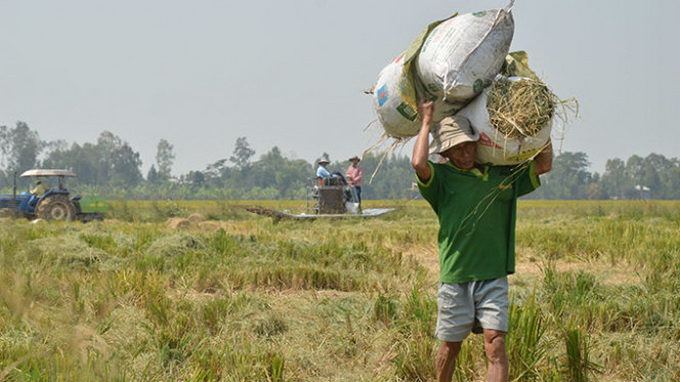Farmers in the southern province of Dong Thap in Vietnam’s Mekong Delta are nurturing their paddy fields with an unusual kind of fertilizer: cement. They do seem to work amid expert warnings.
The other day Le Van Nuoi, a farmer in Long Hau Commune, Lai Vung District, realized that the vegetable crops around his house grew healthier than usual, after they had been accidentally sprinkled with wastewater mixed with cement.
Nuoi had had his house repaired and the water used to mix cement was dumped to the small canals where the vegetables were grown, he explained.
“Cement contains clinker, which is good for the growth of plants so I thought I could use it for my paddy fields,” the farmer said.
Nuoi then tested the ‘cement fertilizer’ on a small area of his rice field, and the result was positive.
“The paddy watered with cement grew as healthily as the rest of the field,” he said.
Nguyen Van Co, another farmer in Long Hau Commune, adopted the same method and eventually found his rice crop “yielding more despite fewer insecticides and lower product costs,” he said.
Co has even come up with a formula to mix cement with urea and potassium to achieve the best result.
“Farmers in nearby communes have also imitated us and gained positive results,” he said.
The owner of a construction material store in Lai Vung said he had recommended that farmers stop using cement as fertilizer, but he is not sure “if they will ever listen.”
In the meantime, Tran Van Hung, chairman of Long Hau Commune, was shocked to learn of such a cultivation method.
“Should I know who is fertilizing their rice fields with cement, I will immediately prevent them and call for relevant agencies to advise them not to do so,” he said.
Nguyen Phuoc Tuyen, head of the scientific research office under the Dong Thap Department of Science and Technology, said despite the clinker content, it is useless to nurture plants with cement.
“Clinker does not affect the plants and farmers will only waster their money,” he said.
“In the longer term, cement will destroy their soil.”
The warning was echoed by Assoc. Prof. Huynh Thanh Hung, vice president of Nong Lam (Agriculture-Forestry) University in Ho Chi Minh City.
“The ‘cement fertilizer’ may generate immediate positive effects, but it will ravage the structure of soil if used for a long time,” he told Tuoi Tre (Youth) newspaper on the phone on Thursday.
Soil will no longer be able to absorb nutrition, water, and moisture, he elaborated.
“Then you will not be able to grow anything on that [destroyed] soil.”
Hung advised that farmers use organic fertilizers for their crops.
“No scientist will ever recommend the use of cement as fertilizer,” he underlined.
Like us on Facebook or follow us on Twitter to get the latest news about Vietnam!




















































